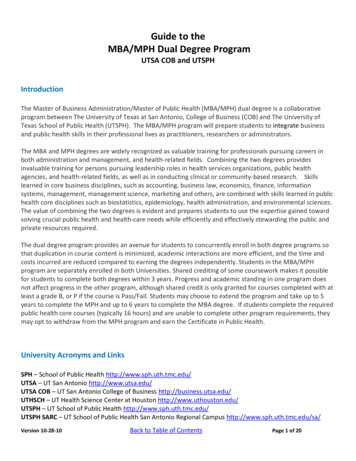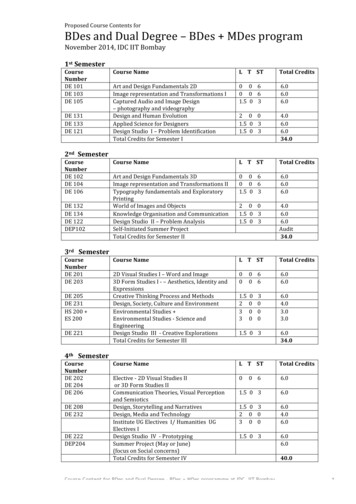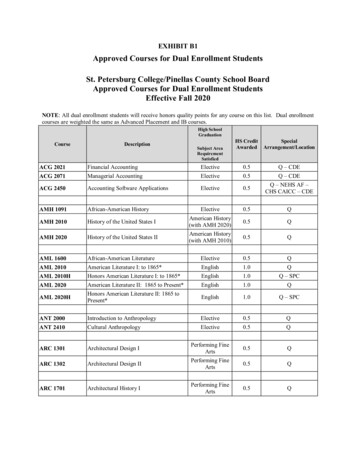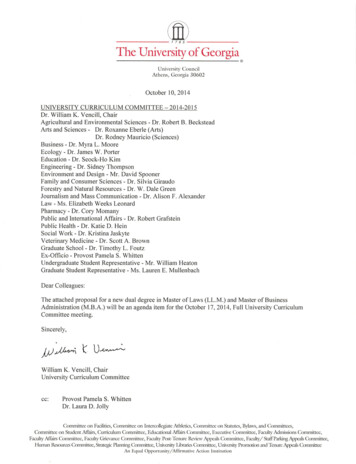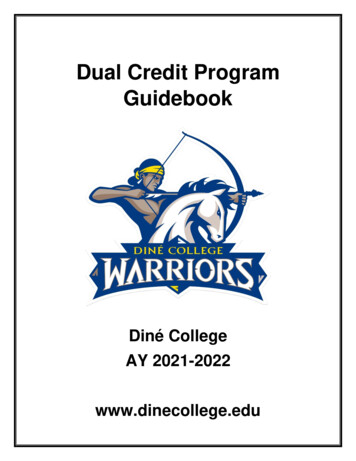
Transcription
Revised 6/23/21Dual Degree Program Handbook(UMass Medical School/UMass Lowell MBA)2021-2022 Academic YearVision and Mission of the MBA Dual Degree ProgramThe University of Massachusetts Medical School (UMMS)/UMass Lowell (UML) dual degree MBAprogram will allow students in the School of Medicine, the Graduate School of Biomedical Sciences andthe Graduate School of Nursing to complete an MBA while completing UMMS coursework andgraduating on time. UMass Lowell’s Manning School of Business offers MBA tracks in Entrepreneurship,Finance, Managerial Leadership, Information Technology and Healthcare. The program calendar hasbeen tailored to individual UMMS graduate program schedules, allowing MBA coursework to take placewithout interfering with the UMMS curriculum. The program offers interprofessional, in-person andblended coursework during summer sessions, with subsequent coursework online.Admissions and EnrollmentCandidates must first be accepted to a UMMS graduate/professional degree program; once accepted toUMMS, then the candidate must apply to the UML MBA program. The MBA application should becompleted as described here: MBA/. A GMATwaiver may be available for students who have taken the MCAT or the GRE. The GMAT waiver process isoutlined in detail on the UML MBA program website and is administered through the MBA admissionsprocess.Previously matriculated UMMS students who are interested in pursuing the MBA degree are advised tocontact the program director for guidance (Christine Vigeant). These students will need to completethe UMass Lowell MBA application and be approved by the UML admissions committee in order toparticipate in the dual degree program. In the case of matriculated UMMS students entering the dualdegree program, it may be recommended that a student pause and take a leave of absence from theUMMS degree program to complete the UML MBA.Once a student has been admitted to and enrolled in the dual degree program, the student mustsatisfactorily complete the requirements for both degrees in order to graduate from both UMMS andUML in the same year. Students in the dual degree program are UMMS students and are subject to allacademic and school policies at UMMS. Accordingly, all students who are admitted to the dual degreeprogram must remain in good academic standing at UMMS in order to continue to pursue the MBAdegree through the dual degree program. Students who are not in good academic standing may beasked to pause in the MBA program until they are able to meet the academic requirements in theUMMS degree program.A copy of the MBA Academic record will be maintained by the UMMS Registrar.Tuition and Financial AidStudents accepted into the UML MBA program must be accepted or matriculated students at UMMSand are subject to all academic, school and institutional policies at UMMS. Tuition and fees for the MBAprogram will be included in the UMass Medical School bill and financial aid package. Therefore, studentsare not expected to consult both UMMS and UML financial aid offices.
Revised 6/23/21Tuition is charged per credit. Tuition rates are set annually for all students enrolled in the dual degreeprogram, regardless of their year/progress in the MBA program. The rates will be posted annually on theMBA dual degree program website. This rate is subject to change in future academic years.The Financial Aid Office at the University of Massachusetts Medical School is part of the Office ofStudent Life and administers Federal and Institutional student loans and gift aid for the School ofMedicine, the Graduate School of Biomedical Sciences and the Graduate School of Nursing. To beeligible for financial assistance, students must be accepted for admission to a UMMS degree program orbe matriculated/enrolled in good standing and making satisfactory academic progress in a UMMSdegree program.Joint Program Curriculum OverviewThe MBA program consists of foundation courses, core courses, and elective courses, totaling 42 credits.Foundation CoursesFoundation courses may be waived if prior coursework meets the criteria described in the UMass Lowellcourse catalog. These courses consist of 12 credits total (6 courses, 2 credits each). They are typicallycompleted in the summer prior to the first UMMS semester. This timing can be flexible to studentsadmitted to the MBA program post-UMMS matriculation. Learners are eligible to receive a Certificateupon completion of the Foundation courses. These courses are described as follows:ACCT.5010 Financial Accounting is an introduction to financial accounting within the context ofbusiness transactions and business decisions. This course is a broad introduction to using accountinginformation from the user’s perspective with little emphasis on traditional debits, credits, journalentries and ledgers. Emphasis is placed on preparing and understanding financial statements.FINA.5010 Business Financial Analysis introduces students to the finance function in a firm. Studentsare exposed to a variety of analytical techniques and to theory applied to financial decision making.Study will include effects of major financial decisions such as investment, financing, and dividendson the value of a firm, in the light of their risk-return relationship under the assumption that themaximization of shareholder wealth is the goal of management. [Prerequisite: ACCT.5010]MKTG.5010 Marketing Fundamentals describes how marketing strategies and plans of a competitiveenterprise are formulated, implemented, and adjusted over time. Behavioral, quantitative, andenvironmental aspects of forces affecting marketing decisions are examined.POMS.5010 Operations Fundamentals provides students with an introduction to operationmanagement and operation analysis. The latter furnished the student with a set of quantitativetools that are useful in designing and operating the former. These techniques are generallyapplicable to other functional areas/courses within the MBA program.MGMT.5010 Organizational Behavior introduces students to management and organizationalbehavior. Its general purpose is to study and understand the behavior of individuals and groups inorganizations. It is directed toward behavioral action components and emphasizes the closerelationship between the study of organizational behavior and the practice of management.MGMT.5110 Global Enterprise and Competition is an integrated investigation of global competitiveissues to help students understand the processes of organization and technological innovation that
Revised 6/23/21permit businesses to achieve competitive advantages in a global environment. This course also dealswith the nature and techniques of industry analysis necessary to the formulation of effective globalstrategy for the firm. [Prerequisites: ACCT.5010, FINA.5010, MKTG.5010, POMS.5010, MGMT.5010]Core CoursesCore courses total 21 credits (7 courses, 3 credits each). These courses can be taken in a blended format;some online and some in person. Core courses are described as follows:ACCT.6010 Accounting Information for Management Decisions focuses on the manager’s view asopposed to the accountant’s view of the decision process and related quantitative and nonquantitative information needs. The course material examines accounting information that willachieve faster, better, and cheaper operations. New strategic cost management models, such asABC and target costing, are explored and contrasted with traditional cost approaches.FINA.6010 Corporate Finance relates working capital strategy, capital investment analysis, long-termfinancing, and capital structure decisions in a risk-return framework to the dynamics of the firm andthe market in which it operates.MKTG.6010 Analysis of Customers and Markets pursues the development of comprehensive andintegrated marketing plans using industry/competitor analysis, market value chains, and forecasting.An emphasis is given to business-to-business marketing situations that require an in-depth analysisof the firms’ complex organizational behavior and evolving buyer-seller relationship.MIST.6010 Management Information Systems examines computer technologies, databasemanagement, and data communications as vehicles to improve and/or restructure businessprocesses and decision-making effectiveness to create competitive advantage.POMS.6010 Operations Management examines the strategic and tactical operations processes ofmanufacturing and service firms that foster global competitiveness. This course focuses ontraditional and newer approaches including just-in-time, total quality management, MRP, flexiblemanufacturing systems, and capacity management that lead to an integrated operations strategy.Cost reductions, flexibility, and market responsiveness are also considered.MGMT.6010 Managing Organization Design and Change examines how business enterprises aredesigned, managed and changed to operate efficiently and perform effectively within theircompetitive environments. It critically examines organizations that vary in terms of suchcharacteristics as size, complexity, goals, and technology as they operate under differentcircumstances and at various stages of their life cycles. The role and impact of individual managersreceive particular attention.MGMT.6910 Strategy Formulation and Implementation reviews strategies for positioning a firmwithin its competitive environment. Fundamental concepts in strategic management; role of theCEO, levels and components of strategy, competitive analysis, and formulation and implementationof strategy are explored. [Capstone Course – Prerequisites: ACCT.6010, FINA.6010, MKTG.6010,POMS.6010, POMS.6010 and MGMT.6010]
Revised 6/23/21Elective CoursesThe elective coursework totals 9 credits (3 courses, 3 credits each). Electives allow students toconcentrate on the areas of focus offered by the MBA program: finance, entrepreneurship, managerialleadership, information technology, and healthcare. Elective offerings can be reviewed within the MBAcourse catalog here.Leaves of AbsenceA Leave of Absence (LOA) is a temporary interruption of studies for one or more semesters. Anapproved LOA at UMMS is generally not for more than one year, except in the case of students pursuingjoint or dual degrees, either at UMMS or in conjunction with another degree-granting program. Leavesof Absence may have financial consequences for financial aid recipients. Please refer to the UMMSBursar’s Office or the Office of Financial Aid for details. Students should also refer to their specific UMMSStudent Handbooks regarding the policies around the number of years to complete the degree. TheMBA dual degree program has allotted time for students to complete both degrees with flexibility ifneeded. Students must adhere to their UMMS graduate/professional school’s specific degree timingrequirements and ensure that they are on track with those requirements.Academic PoliciesAs noted in Admissions and Enrollment (above), students completing the dual degree must remain ingood academic standing at UMMS in order to continue in the dual degree program. Students acceptedinto the dual degree program are also subject to the academic policies of UML and must remain in goodstanding at UML as well. Students enrolled in the MBA dual degree program will be subject to the criteria for AcademicReview and Advancement as detailed in each UMMS graduate school’s Student Handbook. The policies and processes of each UMMS graduate/professional school’s academic evaluationboard(s) are detailed in each school’s student handbook. Student academic progress in the Dual Degree Program will also be monitored by the MBA DualDegree Program Academic Oversight Committee (AOC). Membership of the AOC is describedbelow. If a student’s academic progress or student conduct is brought up as a concern at a UMMSgraduate/professional school academic evaluation board, the AOC will be notified. A student who is not in good standing in the UMMS graduate/professional degree program maybe required by that school’s academic evaluation board to pause in the MBA program untilsatisfactory progress is made in the UMMS degree program. If the UMMS graduate/professional school academic evaluation board recommends that astudent pause in the MBA studies, this will be communicated to the AOC. Determinations regarding adverse recommendations such as a pause in study in the MBAprogram will be made with a holistic understanding of a student’s progress in both degreeprograms. Reciprocally, UMass Lowell reserves the right to consult UMMS’ respective Dean of Studentsregarding a student’s academic progress or conduct in the MBA degree program. If a student enrolled in the MBA dual degree program fails to make satisfactory progress in theUMMS graduate/professional degree program and is dismissed, or is dismissed for otherreasons, including issues pertaining to student conduct, the student may request a transfer ofacademic credits from the dual degree program to UML, and may be permitted to complete theUML MBA outside of the dual degree program, subject to approval by UML. In this case, tuitionand fees will be as published on the UML website at the time of transfer request.
Revised 6/23/21Upon matriculation, students accepted to the MBA dual degree program will be required to sign anAcademic Progress and Student Conduct Disclosure Consent Form, which allows the members of theAOC and the UMMS academic evaluation boards to contact each other should the student haveacademic or conduct issues in either school.MBA Dual Degree Program Academic Oversight Committee (AOC)The AOC will be comprised of the following individuals:UML Manning School of BusinessDean (Co-Chair)Graduate Program DirectorUMMSVice Provost for Student Life (Co-Chair)Dean, GSBSAssociate Dean for Advanced Practice Programs, GSNProgram DirectorRegistrarDirector of Financial Aid
participate in the dual degree program. In the case of matriculated UMMS students entering the dual degree program, it may be recommended that a student pause and take a leave of absence from the UMMS degree program to complete the UML MBA. Once a student has been admitted to and enrolled in the dual degree program, the student must



